2023年江西中考英语复习 专题十一 动词的时态课件(共38张PPT)
文档属性
| 名称 | 2023年江西中考英语复习 专题十一 动词的时态课件(共38张PPT) |  | |
| 格式 | ppt | ||
| 文件大小 | 456.0KB | ||
| 资源类型 | 教案 | ||
| 版本资源 | 人教新目标(Go for it)版 | ||
| 科目 | 英语 | ||
| 更新时间 | 2023-06-17 07:46:38 | ||
图片预览




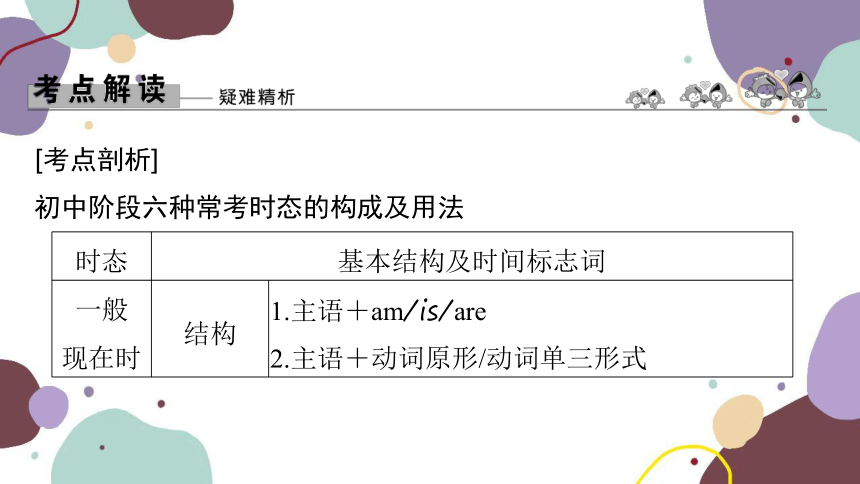
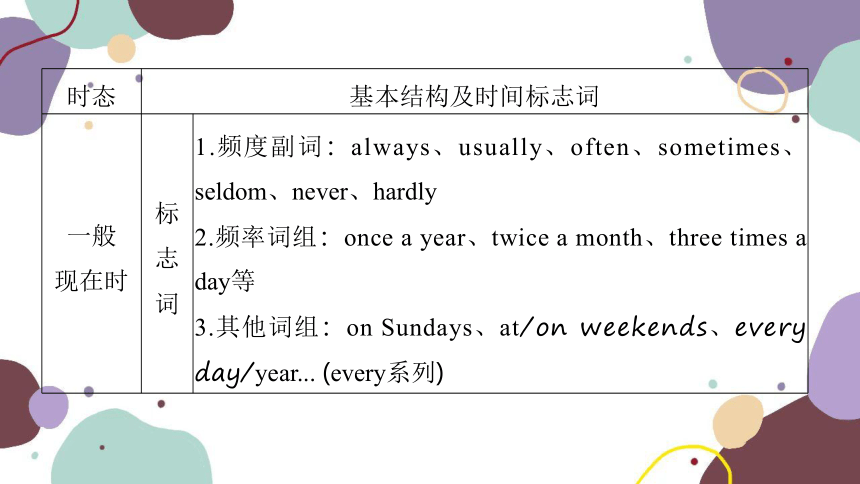
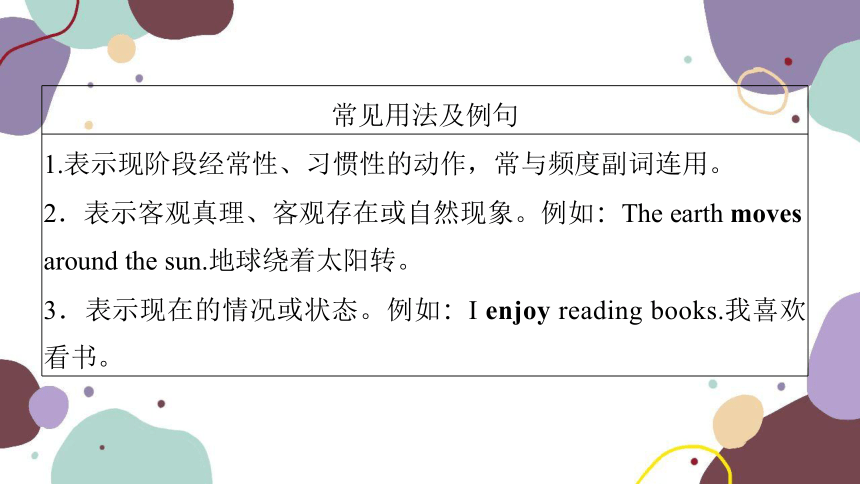
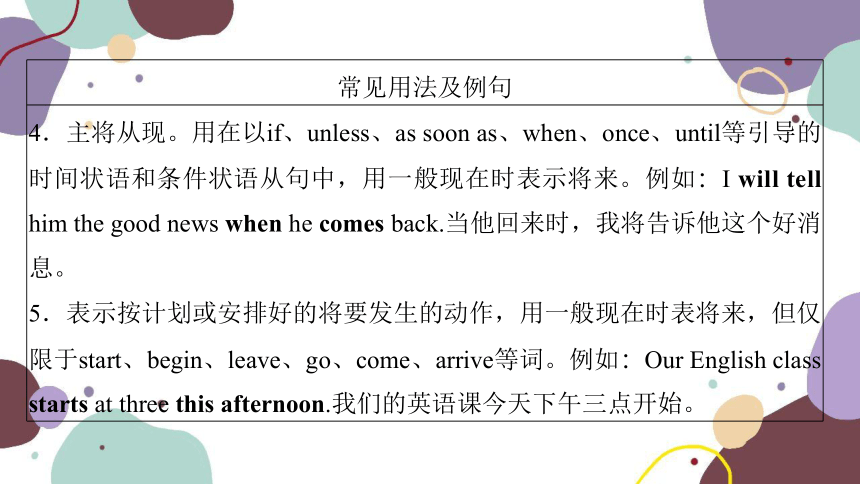
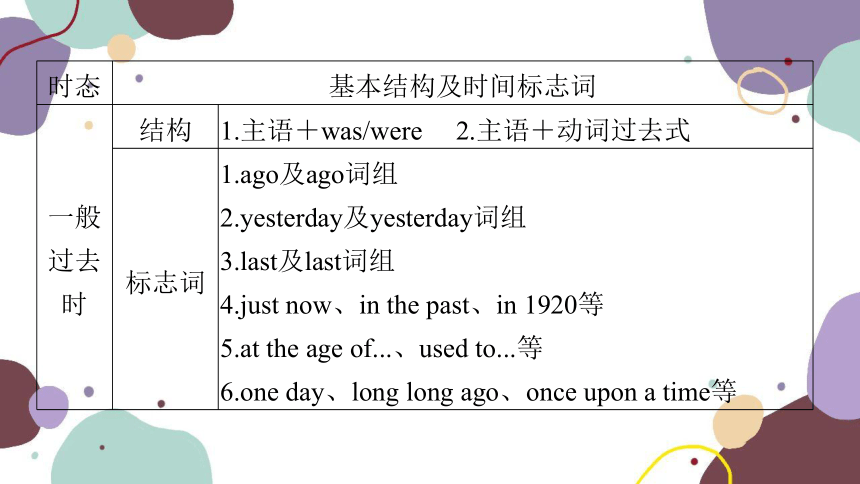

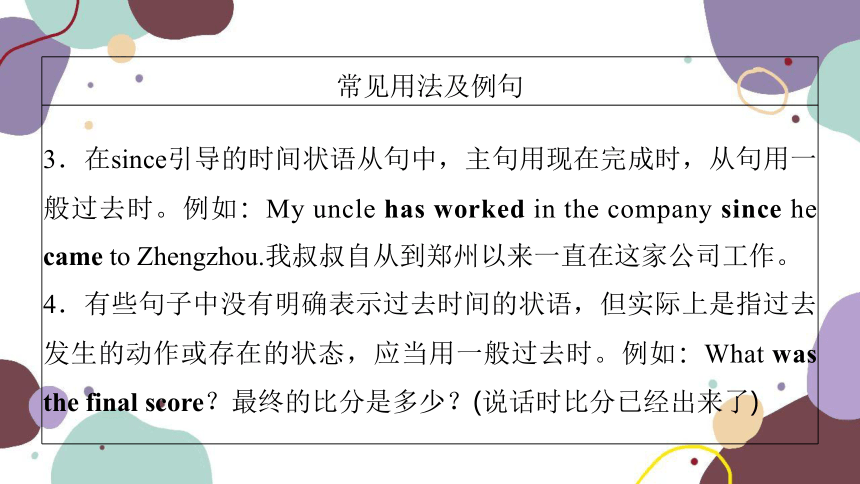
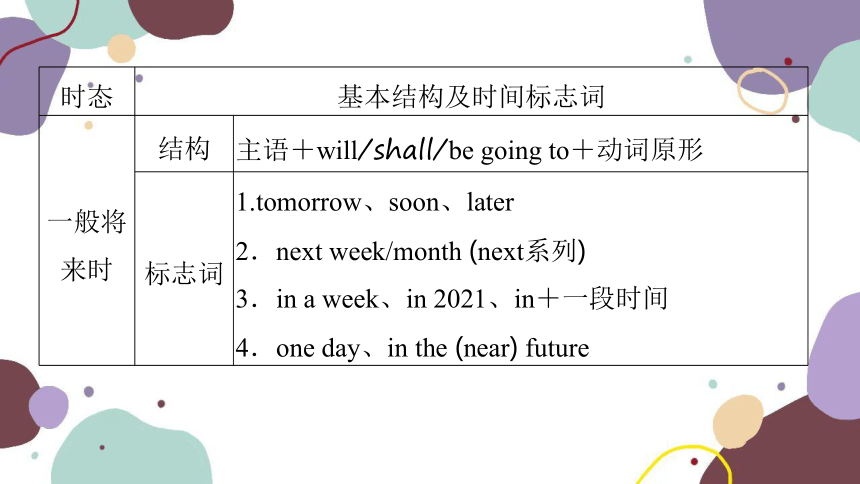
文档简介
(共38张PPT)
专题十一 动词的时态
知识导图
江西省中考八年命题规律及趋势
中考预测
从近八年江西中考来看,动词时态是每年的必考点,单项填空和完形填空B都涉及这个知识点。
[考点剖析]
初中阶段六种常考时态的构成及用法
时态 基本结构及时间标志词
一般
现在时 结构 1.主语+am/is/are
2.主语+动词原形/动词单三形式
时态 基本结构及时间标志词
一般
现在时 标志词 1.频度副词:always、usually、often、sometimes、seldom、never、hardly
2.频率词组:once a year、twice a month、three times a day等
3.其他词组:on Sundays、at/on weekends、every day/year... (every系列)
常见用法及例句
1.表示现阶段经常性、习惯性的动作,常与频度副词连用。
2.表示客观真理、客观存在或自然现象。例如:The earth moves around the sun.地球绕着太阳转。
3.表示现在的情况或状态。例如:I enjoy reading books.我喜欢看书。
常见用法及例句
4.主将从现。用在以if、unless、as soon as、when、once、until等引导的时间状语和条件状语从句中,用一般现在时表示将来。例如:I will tell him the good news when he comes back.当他回来时,我将告诉他这个好消息。
5.表示按计划或安排好的将要发生的动作,用一般现在时表将来,但仅限于start、begin、leave、go、come、arrive等词。例如:Our English class starts at three this afternoon.我们的英语课今天下午三点开始。
时态 基本结构及时间标志词
一般
过去时 结构 1.主语+was/were 2.主语+动词过去式
标志词 1.ago及ago词组
2.yesterday及yesterday词组
3.last及last词组
4.just now、in the past、in 1920等
5.at the age of...、used to...等
6.one day、long long ago、once upon a time等
常见用法及例句
1.表示过去某个时间里所发生的动作或存在的状态。例如:We went to the City Library last week.我们上周去了市图书馆。
2.表示过去常常或反复发生的动作,常与always、usually、often、sometimes、never等频度副词连用。例如:He always took the time to explain things to me clearly whenever I couldn't understand anything.每当我什么都听不懂的时候,他总是花时间给我解释清楚。[人教九(全)Unit 14]
常见用法及例句
3.在since引导的时间状语从句中,主句用现在完成时,从句用一般过去时。例如:My uncle has worked in the company since he came to Zhengzhou.我叔叔自从到郑州以来一直在这家公司工作。
4.有些句子中没有明确表示过去时间的状语,但实际上是指过去发生的动作或存在的状态,应当用一般过去时。例如:What was the final score?最终的比分是多少?(说话时比分已经出来了)
时态 基本结构及时间标志词
一般将来时 结构 主语+will/shall/be going to+动词原形
标志词 1.tomorrow、soon、later
2.next week/month (next系列)
3.in a week、in 2021、in+一段时间
4.one day、in the (near) future
常见用法及例句
1.表示将来发生的动作或存在的状态。例如:Scientists believe that there will be more robots in the future.科学家相信未来会有更多的机器人。[人教八(上)Unit 7]
2.“be going to+动词原形”结构表示计划、打算做某事,表示已决定的、很可能发生的事,或有某种迹象表明要发生的事。例如:Look at the dark clouds.There is going to be a storm.(客观迹象)看那片乌云。这里将要有暴风雨。
常见用法及例句
3.“be doing”结构表示将来,常用于这种结构的动词有go、come、leave、stay、start、begin等,表示即将发生或安排好要做的事情。例如:I'm coming.我来了。
4.“be about to+动词原形”和“be to+动词原形”结构表示即将发生的动作。例如:The plane is about to take off.飞机将要起飞了。
5.表示某种必然的趋势。例如:Fish will die without water.鱼没有水会死。
6.主将从现。
时态 基本结构及时间标志词
现在进行时 结构 主语+am/is/are+动词的现在分词
标志词 1.now、right now
2.at present、at this time、at the/this moment等
3.these days
4.when、while
5.Look!/Listen!
常见用法及例句
1.表示说话人说话时正在进行的动作。例如:Someone is knocking at the door.Can you go and have a look 有人在敲门。你能去看看吗?
2.表示现阶段正在进行的动作或持续的状态。例如:They are exercising hard this month.这个月他们正在努力。
常见用法及例句
3.表示事先计划好或者安排好的将来要做的事情。例如:I'm taking the kids to the zoo this Sunday.这周日我将带着孩子们去动物园。
4.go、leave、arrive、start、come、begin、stop等动词用现在进行时表示将来。例如:My uncle is leaving for Beijing tomorrow.我叔叔明天将去北京。
时态 基本结构及时间标志词
过去
进行时 结构 主语+was/were+动词的现在分词
标志词 1.then
2.at that time、at ten yesterday、at this time yesterday等
3.when/while引导的表示过去时间的状语从句
常见用法及例句
1.表示过去某个时刻正在进行的动作。例如:When you called,I was having a shower.你打电话时,我正在洗沐浴。[人教八(下) Unit 5]
2.表示一个过去的动作发生时,另一个过去的动作正在进行。 例如:I was watering the flowers when it began to rain suddenly.我正在给花浇水,突然开始下雨了。
3.表示两个过去的动作同时进行。例如:I was doing my homework while my mother was cooking.我妈妈煮饭时,我正在写作业。
时态 基本结构及时间标志词
现在完成时 结构 主语+have/has+动词的过去分词
标志词 1.already、ever、never、just、yet、still等
2.recently、lately、so far、up to now、till now等
3.in the past three years
4.since 1998、since+时间点
5.for three years、for+一段时间
常见用法及例句
1.已完成用法:表示过去发生的动作或已经完成的某一动作对现在造成的影响或结果。例如:
—Have you finished your homework yet?你写完作业了吗?
—No,I haven't.我还没有。
2.未完成用法:表示从过去开始持续到现在的动作或状态,也许还要持续下去,常和for、since连用,表示持续的动作或状态多为延续性动词。例如:My father has worked in the hospital for ten years.我父亲已经在医院工作十年了。
常见用法及例句
3.特殊用法:
(1)have gone to 已去某地(未回);
have been to曾去过某地(已回);
have been in 已经在某地。
(2)短暂性动词(瞬间动词)可用于完成时,但不能与时间段(for...、since...)连用,如果句中有时间段,需要将短暂性动词转换为延续性动词。
[考点抢测]
1.I believe more robots in the future.
A.appear B.will appear
C.appeared D.have appeared
2.Ruby her goal to get the first place in this exam.She feels very excited.
A.achieved B.achieves
C.will achieve D.has achieved
B
D
3.If we our best to do it,we will succeed one day.
A.tried B.try
C.have tried D.will try
4.Mr.Black around to offer help while we were doing an experiment.
A.walks B.walked
C.is walking D.will walk
B
B
江西省八年真题明考法
1.(2022·江西)—Sssh!Be quiet. I'm on the phone.
—Who you to,mom
A.do;speak B.are;speaking
C.will;speak D.have;spoken
B
2.(2022·江西)Don't leave your toys on the table,or I them away.
A.threw B.will throw
C.have thrown D.was throwing
3.(2021·江西)—What's that terrible noise
—It's John.He the violin.
A.practiced B.is practicing
C.was practicing D.has practiced
B
B
4.(2021·江西)—How do we turn on the oven
—I you,weren't you listening
A.tell B.am telling
C.will tell D.have told
5.(2020·江西)—The coffee's finished!
—Oh,sorry!I to the shop to get some.
A.am going B.was going
C.went D.have gone
D
A
6.(2020·江西)I don't know the words to a lot of songs,but I do know some folk songs that my grandma me at an early age.
A.teaches B.taught
C.will teach D.has taught
7.(2019·江西)—Hurry up!
—One moment.I my e mails and then I'm ready to go.
A.read B.am reading
C.was reading D.have read
B
B
8.(2019·江西)—I've never seen Mr.Taylor before.
—Don't worry.I him to you before the meeting.
A.will introduce B.introduced
C.have introduced D.had introduced
A
[规律总结]
分析江西近8年中考真题可知,动词的时态在单项填空中考查了16次,除2017年34题出现标志词since,其余需要根据语境来判断用何种时态;在完形填空B中考查了8次,且需根据上下文语境来判断,偶尔根据and、when、in the past、not yet 等词来判断前后时态,具体考查情况如下:
[解题贴士]
考生在解答动词的时态类试题时,一定要注意标志词和句意,且需熟练掌握每种时态的常见用法。
单项填空
1.(2021·河北)You can borrow this film—surely you watching it.
A.enjoy B.enjoyed
C.will enjoy D.have enjoyed
C
2.(2021·温州)My father me a funny joke and I can't stop laughing every time I think of it.
A.told B.tells
C.will tell D.is telling
3.(2021·北部湾经济区)Look,the musician at the piano,ready to play.
A.sat B.will sit
C.is sitting D.was sitting
A
C
4.Before the sun ,we need to get to the top of the mountain.
A.was setting B.sets
C.is setting D.will set
5.Gary takes part in the school singing activity,so he after school.
A.practices B.has practiced
C.will practice D.is practicing
B
A
6.If you hard,your dream to go to college for further study will come true.
A.study B.studied
C.will study D.are studying
7.—What did you do during the holiday
—I to visit the zoo with my family and we had a good time.
A.go B.went
C.have gone D.was going
A
B
8.—I called you yesterday evening,but you were not in.
—Sorry,I in the shop with my mother.
A.am B.will be
C.was D.have been
9.My cousin promised to drive me to school today.But I don't know when we .
A.have left B.left
C.will leave D.leave
C
C
10.Remember that if you are polite and kind to others,they you in the same way.
A.treat B.will treat
C.treated D.have treated
B
专题十一 动词的时态
知识导图
江西省中考八年命题规律及趋势
中考预测
从近八年江西中考来看,动词时态是每年的必考点,单项填空和完形填空B都涉及这个知识点。
[考点剖析]
初中阶段六种常考时态的构成及用法
时态 基本结构及时间标志词
一般
现在时 结构 1.主语+am/is/are
2.主语+动词原形/动词单三形式
时态 基本结构及时间标志词
一般
现在时 标志词 1.频度副词:always、usually、often、sometimes、seldom、never、hardly
2.频率词组:once a year、twice a month、three times a day等
3.其他词组:on Sundays、at/on weekends、every day/year... (every系列)
常见用法及例句
1.表示现阶段经常性、习惯性的动作,常与频度副词连用。
2.表示客观真理、客观存在或自然现象。例如:The earth moves around the sun.地球绕着太阳转。
3.表示现在的情况或状态。例如:I enjoy reading books.我喜欢看书。
常见用法及例句
4.主将从现。用在以if、unless、as soon as、when、once、until等引导的时间状语和条件状语从句中,用一般现在时表示将来。例如:I will tell him the good news when he comes back.当他回来时,我将告诉他这个好消息。
5.表示按计划或安排好的将要发生的动作,用一般现在时表将来,但仅限于start、begin、leave、go、come、arrive等词。例如:Our English class starts at three this afternoon.我们的英语课今天下午三点开始。
时态 基本结构及时间标志词
一般
过去时 结构 1.主语+was/were 2.主语+动词过去式
标志词 1.ago及ago词组
2.yesterday及yesterday词组
3.last及last词组
4.just now、in the past、in 1920等
5.at the age of...、used to...等
6.one day、long long ago、once upon a time等
常见用法及例句
1.表示过去某个时间里所发生的动作或存在的状态。例如:We went to the City Library last week.我们上周去了市图书馆。
2.表示过去常常或反复发生的动作,常与always、usually、often、sometimes、never等频度副词连用。例如:He always took the time to explain things to me clearly whenever I couldn't understand anything.每当我什么都听不懂的时候,他总是花时间给我解释清楚。[人教九(全)Unit 14]
常见用法及例句
3.在since引导的时间状语从句中,主句用现在完成时,从句用一般过去时。例如:My uncle has worked in the company since he came to Zhengzhou.我叔叔自从到郑州以来一直在这家公司工作。
4.有些句子中没有明确表示过去时间的状语,但实际上是指过去发生的动作或存在的状态,应当用一般过去时。例如:What was the final score?最终的比分是多少?(说话时比分已经出来了)
时态 基本结构及时间标志词
一般将来时 结构 主语+will/shall/be going to+动词原形
标志词 1.tomorrow、soon、later
2.next week/month (next系列)
3.in a week、in 2021、in+一段时间
4.one day、in the (near) future
常见用法及例句
1.表示将来发生的动作或存在的状态。例如:Scientists believe that there will be more robots in the future.科学家相信未来会有更多的机器人。[人教八(上)Unit 7]
2.“be going to+动词原形”结构表示计划、打算做某事,表示已决定的、很可能发生的事,或有某种迹象表明要发生的事。例如:Look at the dark clouds.There is going to be a storm.(客观迹象)看那片乌云。这里将要有暴风雨。
常见用法及例句
3.“be doing”结构表示将来,常用于这种结构的动词有go、come、leave、stay、start、begin等,表示即将发生或安排好要做的事情。例如:I'm coming.我来了。
4.“be about to+动词原形”和“be to+动词原形”结构表示即将发生的动作。例如:The plane is about to take off.飞机将要起飞了。
5.表示某种必然的趋势。例如:Fish will die without water.鱼没有水会死。
6.主将从现。
时态 基本结构及时间标志词
现在进行时 结构 主语+am/is/are+动词的现在分词
标志词 1.now、right now
2.at present、at this time、at the/this moment等
3.these days
4.when、while
5.Look!/Listen!
常见用法及例句
1.表示说话人说话时正在进行的动作。例如:Someone is knocking at the door.Can you go and have a look 有人在敲门。你能去看看吗?
2.表示现阶段正在进行的动作或持续的状态。例如:They are exercising hard this month.这个月他们正在努力。
常见用法及例句
3.表示事先计划好或者安排好的将来要做的事情。例如:I'm taking the kids to the zoo this Sunday.这周日我将带着孩子们去动物园。
4.go、leave、arrive、start、come、begin、stop等动词用现在进行时表示将来。例如:My uncle is leaving for Beijing tomorrow.我叔叔明天将去北京。
时态 基本结构及时间标志词
过去
进行时 结构 主语+was/were+动词的现在分词
标志词 1.then
2.at that time、at ten yesterday、at this time yesterday等
3.when/while引导的表示过去时间的状语从句
常见用法及例句
1.表示过去某个时刻正在进行的动作。例如:When you called,I was having a shower.你打电话时,我正在洗沐浴。[人教八(下) Unit 5]
2.表示一个过去的动作发生时,另一个过去的动作正在进行。 例如:I was watering the flowers when it began to rain suddenly.我正在给花浇水,突然开始下雨了。
3.表示两个过去的动作同时进行。例如:I was doing my homework while my mother was cooking.我妈妈煮饭时,我正在写作业。
时态 基本结构及时间标志词
现在完成时 结构 主语+have/has+动词的过去分词
标志词 1.already、ever、never、just、yet、still等
2.recently、lately、so far、up to now、till now等
3.in the past three years
4.since 1998、since+时间点
5.for three years、for+一段时间
常见用法及例句
1.已完成用法:表示过去发生的动作或已经完成的某一动作对现在造成的影响或结果。例如:
—Have you finished your homework yet?你写完作业了吗?
—No,I haven't.我还没有。
2.未完成用法:表示从过去开始持续到现在的动作或状态,也许还要持续下去,常和for、since连用,表示持续的动作或状态多为延续性动词。例如:My father has worked in the hospital for ten years.我父亲已经在医院工作十年了。
常见用法及例句
3.特殊用法:
(1)have gone to 已去某地(未回);
have been to曾去过某地(已回);
have been in 已经在某地。
(2)短暂性动词(瞬间动词)可用于完成时,但不能与时间段(for...、since...)连用,如果句中有时间段,需要将短暂性动词转换为延续性动词。
[考点抢测]
1.I believe more robots in the future.
A.appear B.will appear
C.appeared D.have appeared
2.Ruby her goal to get the first place in this exam.She feels very excited.
A.achieved B.achieves
C.will achieve D.has achieved
B
D
3.If we our best to do it,we will succeed one day.
A.tried B.try
C.have tried D.will try
4.Mr.Black around to offer help while we were doing an experiment.
A.walks B.walked
C.is walking D.will walk
B
B
江西省八年真题明考法
1.(2022·江西)—Sssh!Be quiet. I'm on the phone.
—Who you to,mom
A.do;speak B.are;speaking
C.will;speak D.have;spoken
B
2.(2022·江西)Don't leave your toys on the table,or I them away.
A.threw B.will throw
C.have thrown D.was throwing
3.(2021·江西)—What's that terrible noise
—It's John.He the violin.
A.practiced B.is practicing
C.was practicing D.has practiced
B
B
4.(2021·江西)—How do we turn on the oven
—I you,weren't you listening
A.tell B.am telling
C.will tell D.have told
5.(2020·江西)—The coffee's finished!
—Oh,sorry!I to the shop to get some.
A.am going B.was going
C.went D.have gone
D
A
6.(2020·江西)I don't know the words to a lot of songs,but I do know some folk songs that my grandma me at an early age.
A.teaches B.taught
C.will teach D.has taught
7.(2019·江西)—Hurry up!
—One moment.I my e mails and then I'm ready to go.
A.read B.am reading
C.was reading D.have read
B
B
8.(2019·江西)—I've never seen Mr.Taylor before.
—Don't worry.I him to you before the meeting.
A.will introduce B.introduced
C.have introduced D.had introduced
A
[规律总结]
分析江西近8年中考真题可知,动词的时态在单项填空中考查了16次,除2017年34题出现标志词since,其余需要根据语境来判断用何种时态;在完形填空B中考查了8次,且需根据上下文语境来判断,偶尔根据and、when、in the past、not yet 等词来判断前后时态,具体考查情况如下:
[解题贴士]
考生在解答动词的时态类试题时,一定要注意标志词和句意,且需熟练掌握每种时态的常见用法。
单项填空
1.(2021·河北)You can borrow this film—surely you watching it.
A.enjoy B.enjoyed
C.will enjoy D.have enjoyed
C
2.(2021·温州)My father me a funny joke and I can't stop laughing every time I think of it.
A.told B.tells
C.will tell D.is telling
3.(2021·北部湾经济区)Look,the musician at the piano,ready to play.
A.sat B.will sit
C.is sitting D.was sitting
A
C
4.Before the sun ,we need to get to the top of the mountain.
A.was setting B.sets
C.is setting D.will set
5.Gary takes part in the school singing activity,so he after school.
A.practices B.has practiced
C.will practice D.is practicing
B
A
6.If you hard,your dream to go to college for further study will come true.
A.study B.studied
C.will study D.are studying
7.—What did you do during the holiday
—I to visit the zoo with my family and we had a good time.
A.go B.went
C.have gone D.was going
A
B
8.—I called you yesterday evening,but you were not in.
—Sorry,I in the shop with my mother.
A.am B.will be
C.was D.have been
9.My cousin promised to drive me to school today.But I don't know when we .
A.have left B.left
C.will leave D.leave
C
C
10.Remember that if you are polite and kind to others,they you in the same way.
A.treat B.will treat
C.treated D.have treated
B
同课章节目录
- 词法
- 名词
- 动词和动词短语
- 动词语态
- 动词时态
- 助动词和情态动词
- 非谓语动词
- 冠词
- 代词
- 数词和量词
- 形容词副词及其比较等级
- 介词和介词短语
- 连词和感叹词
- 构词法
- 相似、相近词比较
- 句法
- 陈述句
- 一般疑问句和否定疑问句
- 特殊疑问句及选择疑问句
- 反意疑问句
- 存在句(There be句型)
- 宾语从句
- 定语从句
- 状语从句
- 主谓一致问题
- 简单句
- 并列句
- 复合句
- 主谓一致
- 主、表语从句
- 名词性从句
- 直接引语和间接引语
- 虚拟语气
- 感叹句
- 强调句
- 倒装句
- 祈使句
- 句子的成分
- 句子的分类
- 题型专区
- 单项选择部分
- 易错题
- 完形填空
- 阅读理解
- 词汇练习
- 听说训练
- 句型转换
- 补全对话
- 短文改错
- 翻译
- 书面表达
- 任务型阅读
- 语法填空
- 其他资料
